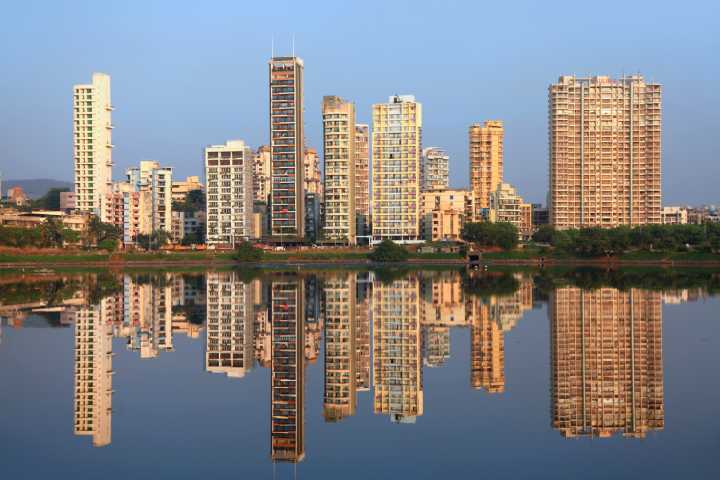The Government of India launched the Clean Cities initiative as part of the Swachh Bharat mission to promote cleanliness and living standards in Indian cities. As a part of this initiative, the government announces the Top 10 Cleanest Cities in India every year.
To Execute this Mission, The Ministry of Housing and Urban Affairs conducts the Swachh Survekshan survey annually across various cities.
This survey classifies cities based on population size and conducts the evaluation process using parameters like
- Service level progress parameters like processing, segregation and disposal of waste
- Certifications like GFC star rating, ODF+, Water+
- Citizen’s voice by feedback, engagement and experience
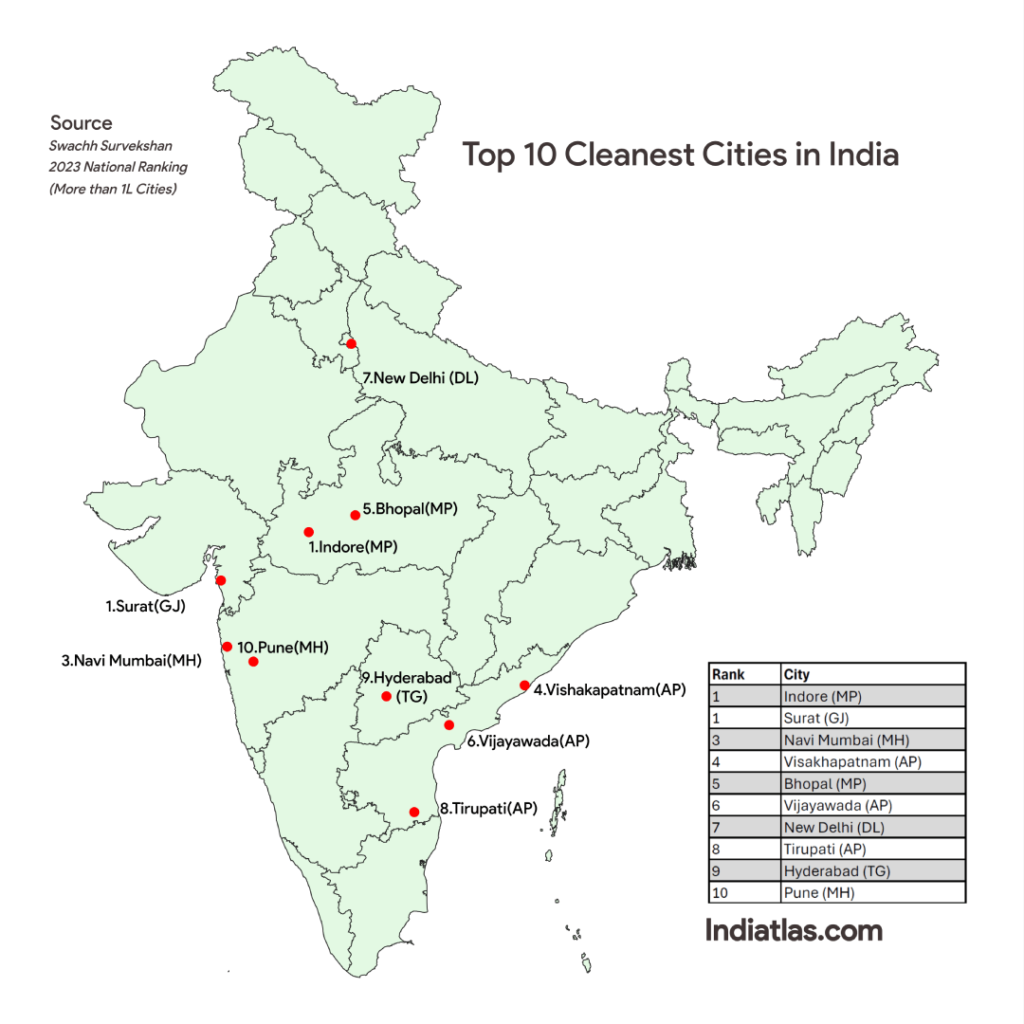
| Rank | City | State | Swachh Survekshan Points out of 10,000 |
|---|---|---|---|
| 1 | Indore | Madhya Pradesh | 9348 |
| 1 | Surat | Gujarat | 9348 |
| 3 | Navi Mumbai | Maharashtra | 9240 |
| 4 | Visakhapatnam | Andhra Pradesh | 8879 |
| 5 | Bhopal | Madhya Pradesh | 8855 |
| 6 | Vijayawada | Andhra Pradesh | 8751 |
| 7 | New Delhi | Delhi | 8728 |
| 8 | Tirupati | Andhra Pradesh | 8624 |
| 9 | Hyderabad | Telangana | 8601 |
| 10 | Pune | Maharashtra | 8595 |
1. Indore, Madhya Pradesh
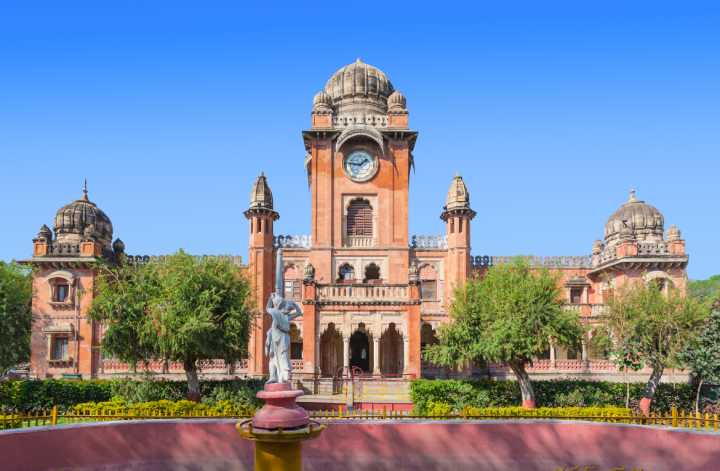
The commertial City of Madhya Pradesh, Indore has consistently ranked as the cleanest city in India seven times in a row in the Swachh Survekshan rankings.
It is also the first city in India to receive a Water-plus rating during the 2021 survey. Indore is also one of the top 10 Greenest cities in India.
The city stays on top with effective waste management practices, provision of public toilets, and regular cleanliness efforts.
Moreover, it has Asia’s largest bio-CNG plant, capable of producing 17000-18000 kg of Bio-CNG and 10 tons of organic manure.
2. Surat, Gujarat
Surat has been one of the top 10 cleanest cities in India since 2016. After being in second place for more than three years, it regained the top place alongside Indore in 2023, scoring 9348 points.
Surat City’s municipal corporation proactively undertook multiple initiatives to keep the city clean and maintain good hygiene. Some noteworthy initiatives are having door-to-door garbage collection, cleanliness drives, sweeping roads, and provisioning public toilets at multiple locations.
The city’s state-of-the-art Integrated Command and Control Centre (ICCC) monitors activities such as tracking garbage vehicle movements, managing garbage pileups, and addressing citizen’s grievances.
Surat City has one of the best in class dedicated waste management plans for handling industrial, biomedical, construction & demolition, and e-waste.
It has bagged multiple awards, such as the Skoch Smart City Award, Swachh City Award, Best Big City in solid waste management practices and several appreciations.
3. Navi Mumbai, Maharashtra
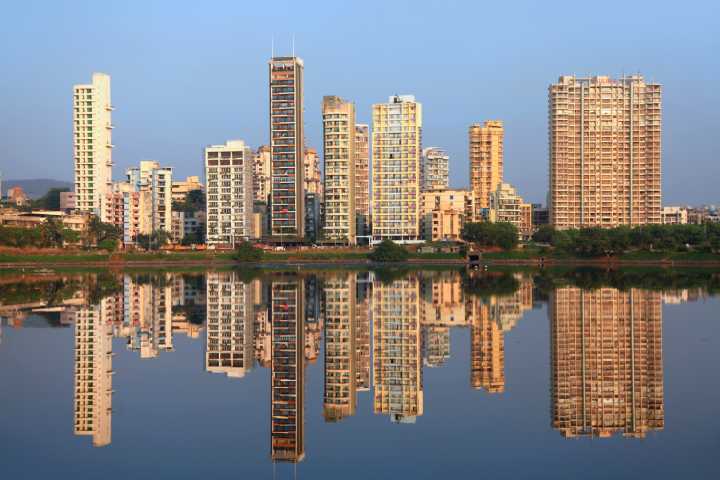
The Financial capital of India, Navi Mumbai had ranked as the 3rd cleanest city in India under the category of cities with more than 1 lakh population, scoring 9240 points.
Credit goes to Navi Mumbai municipal corporation and its citizens, who worked hard to improve its ranking from 7th to 3rd in 2023.
NMMC improved the city’s ranking with support from citizens, civil workers, and officials.
The city received a 7-star rating as a garbage-free city under the prestigious Swachh Survekshan survey.
It is the only city in the State of Maharashtra and one among the two cities in India to receive this rating.
Besides its title as a garbage-free city, Navi Mumbai also secured the highest Water-plus rating in the Open Defecation Free (ODF) category for pollution-free cities.
4. Visakhapatnam, Andhra Pradesh
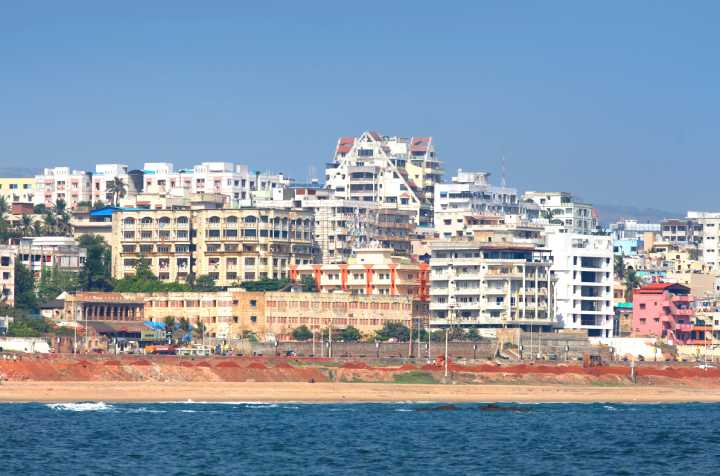
This beautiful port city of Andhra Pradesh ranked as the 4th cleanest city in India under the Swatch Bharat Mission due to the combined efforts of its citizens, Greater Visakha Municipal Corporation (GVMC), and Visakhapatnam Port Authority.
The GVMC authorities ensured that the city and the beaches were kept clean round the clock by timely garbage collection, waste segregation, provision of public toilets, and community participation.
In addition, they also undertook initiatives such as celebrity participation in cleanliness drives and working with educational institutions and offices to contribute a fraction of their time to volunteer to keep the city clean.
The Vishakhapatnam Port Authority(VPA) took the initiative titled Ek Tareekh, Ek Ganta, Ek Saath under the Swachh Bharat Abhiyan 3.0.
It encouraged its employees and private workers to clean the dock area premises actively, making VPA the only port to observe Swachh Bharat.
5. Bhopal – Madhya Pradesh
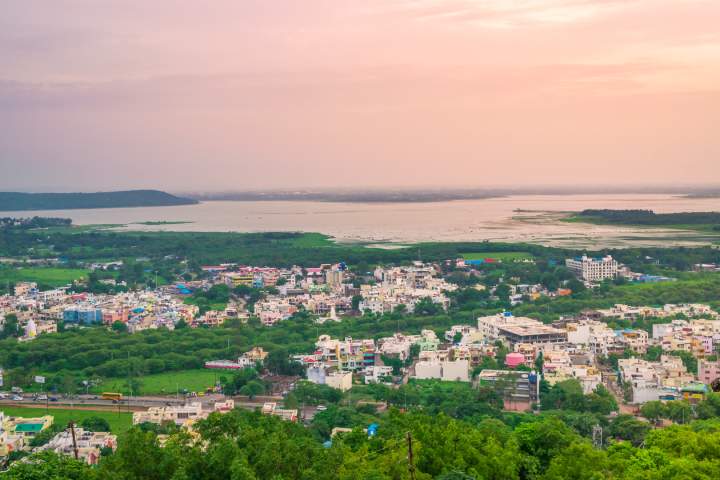
The capital city of Madhya Pradesh, Bhopal, moved from 6th position in 2022 and secured the 5th spot in the 2023 Swachh Survekshan rankings. Making it one of the cleanest capitals in India.
This City’s municipal corporation has 12 transfer stations, 10 recycling facilities, a biomedical waste treatment facility, and 100 TPD capacity construction waste units.
By collaborating with the prestigious NTPC, the City authorities installed a Bio-CNG plant with a processing capacity of 400 TPD. This is expected to yield 80 Metric tons of organic manure.
Overall, Bhopal is excelling in city cleanliness and taking measures to turn waste into a fuel source.
6. Vijayawada – Andhra Pradesh
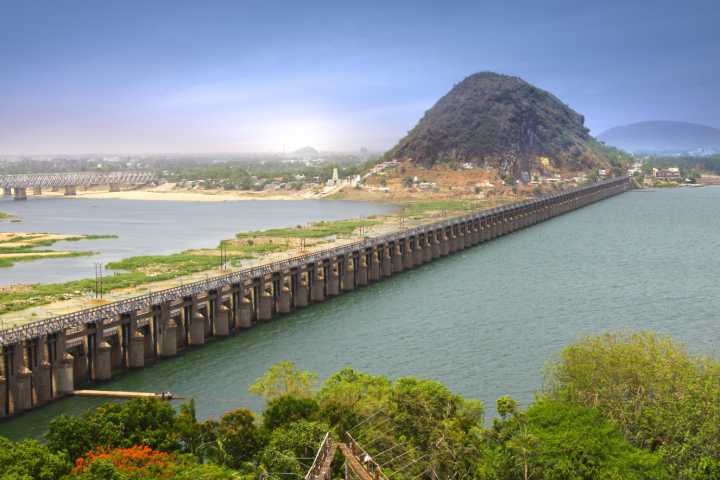
Another major city in Andhra Pradesh, Vijayawada, is among the top 10 cleanest cities in India. This City is known for maintaining one of the best sustainable waste management practices to promote cleanliness.
The Vijayawada Municipal Corporation implemented various initiatives to keep the city clean, such as reducing plastic waste by promoting cloth bags, turning dump sites into green spaces, and providing public toilets at several locations.
The city’s Swachh Vijayawada app allows residents to report cleanliness-related issues and track the progress of their complaints.
The City has nearly 4,000 sanitation workers and 300 wet waste workers, ensuring cleanliness and hygiene around the clock.
A state-of-the-art material recycling facility and waste energy plant manages the 520 tons of waste generated daily.
Vijayawada also has six vermicompost plants, four windrow compost plants, and a biogas plant that turns organic waste into fuel and manure.
7. New Delhi
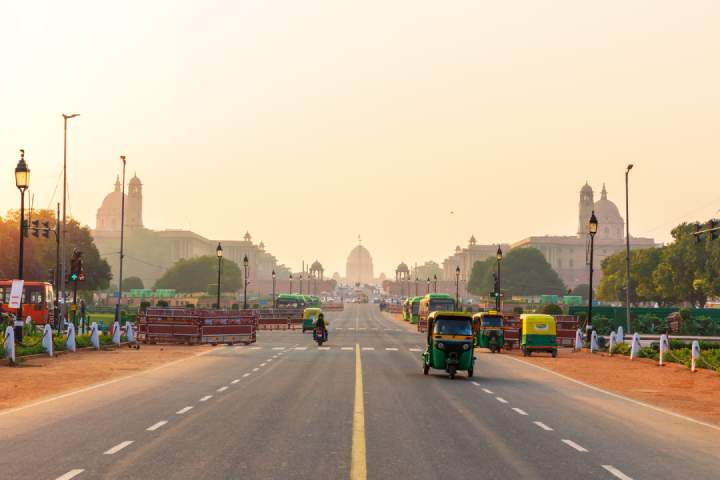
The Capital City of India stood 7th in the top 10 cleanest cities in India, securing a 5-star garbage-free rating in the Swachh Survekshan survey.
With a population of 3.2 crores, New Delhi does an outstanding job handling massive waste generated daily with its robust technology and services.
Some include door-to-door garbage collection, bins for home composting, refurbishing discarded waste, and conducting awareness programs on cleanliness and environmental protection.
The NDMC undertook a unique campaign called Meri life, Mera swachh shehar to champion the 3Rs of waste management – reduce, reuse, and recycle. The campaign re-checks and refurbishes discarded waste items of no use.
The Corporation aims to divert all waste from landfills by utilizing a 200 TPD capacity waste-to-energy plant in Okhla. In addition, six decentralized material recovery facilities were in the process of construction.
The sewage water generated from the city is treated across 35 STPs. The treated water is used for horticulture and fountains across the city.
8. Tirupati, Andhra Pradesh
The abode of Lord Balaji, Tirupati, stands 8th in the list of top 10 cleanest cities in India, receiving a 5-star garbage-free city and water-plus rating.
The city efficiently handles 115 tons of daily waste despite its large population and influx of devotees.
Tirupati Municipal Corporation has employed nearly 1000 sanitation workers to ensure the city’s sanitation services occur effectively in every area.
To ensure 100% door-to-door waste collection, the city provides infrastructure like specially equipped auto tippers. These vehicles have separate compartments for sorting plastic and non-plastic waste.
To ease the burden on the centralized waste processing unit, the municipal Corporation established six decentralized facilities and three Bio chest machines at markets and gardens where a significant amount of organic waste gets generated.
The city also has an advanced plastic waste management facility to recycle low-grade plastic into granules. With this process, the City could sell 263.29 tons of plastic granules in just one year.
A bio-methanation plant with 50 TPD capacity is established at Thukivakam that converts organic waste into bio-methane gas and compost. The biogas generated is sold to hotels and industries for cooking, while the compost is used for agriculture and gardening.
9. Hyderabad, Telangana
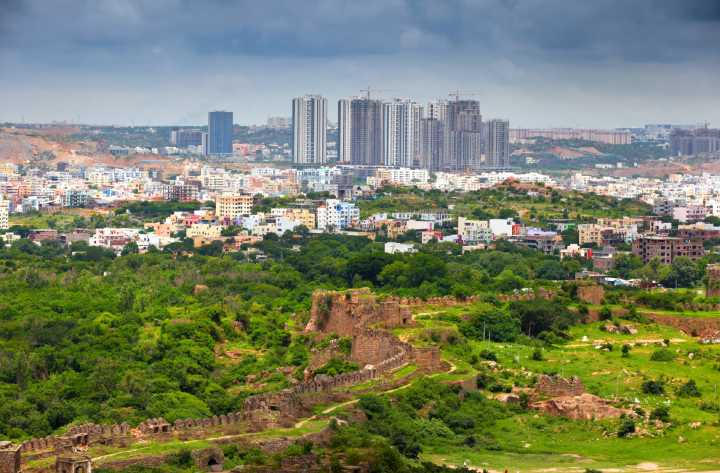
Telangana’s capital, Hyderabad has emerged as the 9th cleanest city in India under the category of Cities with more than 1 lakh population. It was rated as a 5-star garbage-free city and re-certified as a Water-plus City by MoHUA.
The City authorities took significant measures, skyrocketing its rankings from 22nd in 2017 to 9th in 2023 Swachh Survekshan rankings. The credit goes to the governing body GHMC and the active contribution of the Hyderabad citizens.
Initiatives such as door-to-door garbage collection, provision of litter bins, public toilets, and proper waste treatment contributed to city cleanliness.
The city has over 20,000 sanitation workers who perform various duties such as sweeping residential roads, clearing drain blockages, collecting garbage, segregating wet and dry waste, and preventing mosquitoes.
10. Pune, Maharashtra
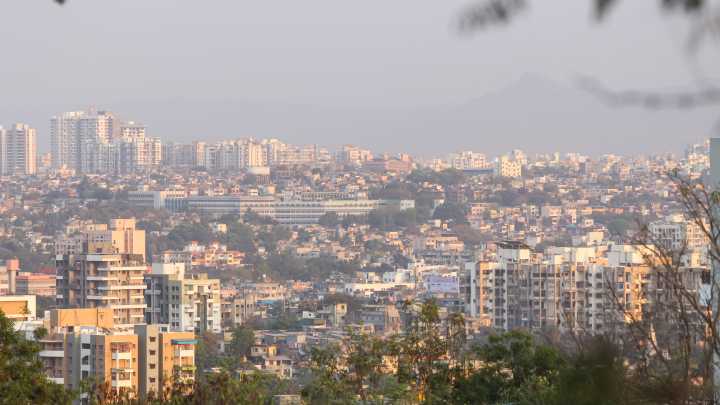
The Swachh Survekshan survey announced Pune as the 10th Cleanest city in India. Pune has a population of 39 Lakhs as per 2023 estimates and is one of the Top 10 most populated cities in India.
In the 2022 survey, the city was in 9th position. In 2023, it dropped to 10th place. The PMC and its citizens are working hard to reclaim the top spot.
One of the city’s uniqueness is its excellent community participation. Its citizens are actively involved in cleanliness drives, cleaning up streets, clearing away waste plants in the streets, planting trees, and painting the city walls with beautiful pictures.
On the other hand, the municipal corporation is making multiple efforts to make the city clean and livable. It employed over 3000 marginalized women workers providing door-to-door waste collection to over 6 Lakhs homes.
The city has boosted its waste management infrastructure, which can recycle more than 50,000 tonnes of waste annually.
The Pune Municipal Corporation collaborated with Nobel Exchange to establish a Bio CNG plant with 350 TPD Bio methanation capacity. This initiative handles the city’s organic waste and fuels the public buses.
